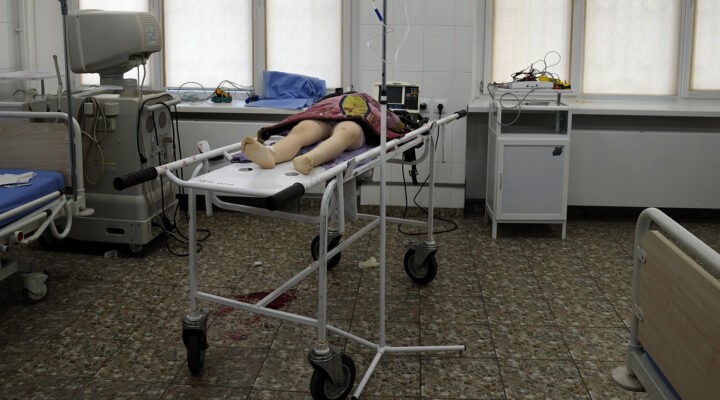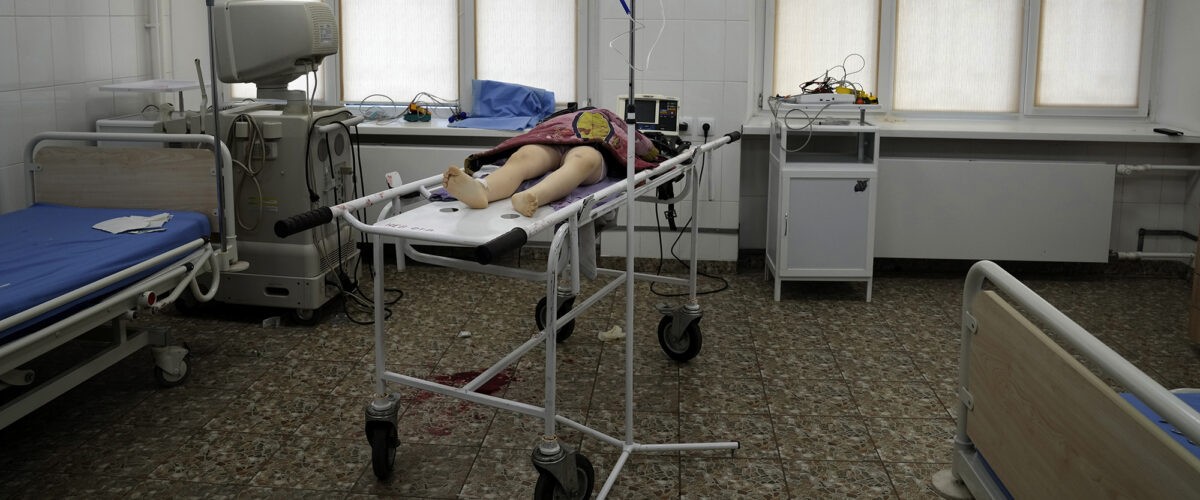While his president bombed children in Ukraine, the patriarch of the Russian Orthodox church used his March 6 Sunday sermon to name the real source of the war started by Russia against its neighbor: Gay pride parades.
Patriarch Kirill preached at the Cathedral of Christ the Savior in Moscow on what is known in the Orthodox Church as “Forgiveness Sunday,” marking the coming of the Lenten season.
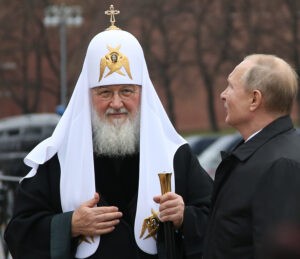
Russian President Vladimir Putin and Orthodox Patriarch Kirill at Red Square on November 4, 2019, in Moscow, Russia. (Photo by Mikhail Svetlov/Getty Images)
Kirill spoke directly to the Russian invasion of Ukraine but situated it in the context of Russians and Russian separatists who have been fighting the Ukrainian government in the region of Donbas prior to the current war. The Donbas is the easternmost region of Ukraine bordering Russia. The region’s unofficial capital is Donetsk.
“For eight years there have been attempts to destroy what exists in the Donbas,” the patriarch preached. “And in the Donbas there is rejection, a fundamental rejection of the so-called values that are offered today by those who claim world power.
“Today there is a test for the loyalty to this new world order, a kind of pass to that ‘happy’ world, the world of excess consumption, the world of false ‘freedom.’ Do you know what this test is? The test is very simple and at the same time terrible — it is the Gay Pride parade. The demands on many to hold a gay parade are a test of their loyalty to the new world order; and we know that if people or countries reject these demands, then they do not enter into that world order, they become strangers to it.”
With no reference to Russia’s unprovoked aggression against Ukraine and no sense of irony that his comments were delivered within a sermon ostensibly about forgiveness, the patriarch spoke of the “sin” of Gay Pride.
“This is a sin that is condemned by the word of God, both the Old and the New Testament. Moreover, the Lord, condemning sin, does not condemn the sinner. He only calls him to repentance, but not to ensure that through a sinful person and his behavior, sin becomes a life standard, a variation of human behavior regarded as respected and acceptable.”
Bitter Winter, an online magazine on religious freedom and human rights, published an English translation of the March 6 sermon with only a brief — but biting — commentary on it.
With no reference to Russia’s unprovoked aggression against Ukraine and no sense of irony that his comments were delivered within a sermon ostensibly about forgiveness, the patriarch spoke of the “sin” of Gay Pride.
“Surely, there can be different opinions about the Gay Pride parades and criticizing these events from a religious point of view is also part of religious liberty. However, using them as a pretext to justify the military aggression of another country and the bombing and killing of thousands of women, men and children, and doing it as a leader of a large religious body giving a sermon in his cathedral, is — to call it with its proper name — a shame and a scandal,” the website declares. “The Russian soccer team has been expelled from the World Cup. Shouldn’t the World Council of Churches and the churches in ecumenical dialogue with the Russian Orthodox Church take some action after this sermon? Should not the international pro-family movement itself denounce the manipulation of its values to justify aggression and war?”
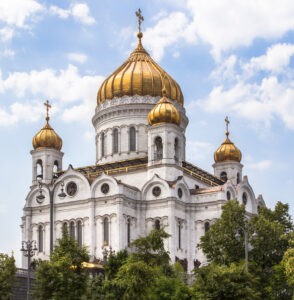
View of the Cathedral of Christ the Savior in Moscow, Russia (Shutterstock)
But Gay Pride parades were not the only peculiar thing on the patriarch’s mind last Sunday. He spoke of the coming spring, which he described as “a powerful juice breaks through to a height of ten, twenty, one hundred meters, reviving the trees. This is truly an amazing miracle of God, a miracle of life.”
And this juicy miracle is a reminder that “the entire Christian faith that we share with you is a faith that affirms life, which is against death, against destruction, which affirms the need to follow divine laws, in order to live, in order not to perish either in this world or in the world to come.”
Yes, amid the coming spring there are “grave events related to the deterioration of the political situation in the Donbas,” he said, claiming the oppression of Russian separatists in this region is “almost the beginning of hostilities.”
And that, too, is fundamentally about Gay Pride parades, the patriarch said.
“If humanity starts believing that sin is not a violation of God’s law, if humanity agrees that sin is one of the options for human behavior, then human civilization will end there. And Gay Pride parades are designed to demonstrate that sin is one of the legitimate variations of human behavior.
“That is why in order to enter the club of those ‘free’ countries, it is necessary to hold a Gay Pride parade. Not to make a political statement ‘we are with you,’ not to sign any agreements, but to hold a Gay Pride parade. And we know how people resist these demands and how this resistance is suppressed by force. This means that we are talking about imposing by force a sin condemned by God’s law, and therefore, to impose on people by brutal force the denial of God and his truth.”
“That is why in order to enter the club of those ‘free’ countries, it is necessary to hold a Gay Pride parade.”
This is about much more than international relations or global politics, Kirill reasoned. “We are talking about human salvation, about where humanity will end up, on which side of God the Savior, who comes into the world as its Judge and Creator, on the right or on the left, we will be. Today, out of weakness, stupidity, ignorance and most often out of unwillingness to resist, many go there, to the left side. And all that is connected with the justification of sin, condemned by the Bible, is today a test for our faithfulness to the Lord, for our ability to confess faith in our Savior.”
The ”left” is bad and the “right” is good in God’s eyes, the patriarch said, with nary a reference to the prohibition against murder in the Ten Commandments or the command of Jesus to love your neighbor as yourself.
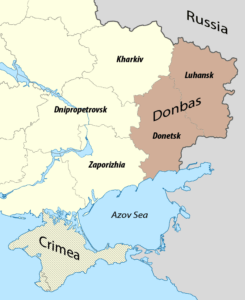
(Wikipedia)
No, in his eyes, the Russian invasion of Ukraine is justified because the world has not come to the aid of the Russian separatists who for eight years have been trying to wrest control of the Donbas from Ukraine.
“Eight years of suffering and the whole world is silent. What does that mean? But we know that our brothers and sisters are really suffering; moreover, they may suffer for their loyalty to our church.”
And in a single breath, he then turned to preach about forgiveness.
“On Forgiveness Sunday, on the one hand, as your shepherd, I call on everyone to forgive sins and insults, including where it is very difficult to do this, where people are at war with each other. But forgiveness without justice is capitulation and weakness. Therefore, forgiveness must be accompanied by the indispensable preservation of the right to stand on the right side of the world, on the side of God’s truth, on the side of the Divine Commandments, on the side of what the Light of Christ, his word, his gospel, his greatest covenants given to the human race, reveal to us.”
“Forgiveness without justice is capitulation and weakness.”
The patriarch then chided his congregants for “choosing the path of least resistance in this war” and following “the path that the powers that be show them.”
The righteous, he exhorted, should support the Russian separatists in the Donbas because “Orthodox people are undoubtedly suffering, and we cannot but be with them, first of all in prayer. It is necessary to pray that the Lord would help them to preserve the Orthodox faith, not to succumb to the temptation of this world.”
He also called his congregants to pray for peace, but specifically “that the blood of our brothers and sisters will stop flowing, that the Lord will incline his mercy to the long-suffering Donbas land, which has been bearing this mournful stamp for eight years, generated by human sin and hatred.”
Then he pivoted back to Lent, with a word on the importance of attempting to “forgive everyone.”
But again with a caveat: “If you ask for forgiveness from a person who has broken the law or done something evil and unfair to you, you thereby do not justify his behavior, but simply stop hating this person. He ceases to be your enemy, which means that by your forgiveness you deliver him to the judgment of God. This is the true meaning of forgiving each other our sins and mistakes. We forgive, we renounce hatred and vindictiveness, but we cannot there, in the face of heaven, accept what is not true; therefore, by our forgiveness, we commit our offenders into the hands of God, so that both God’s judgment and God’s mercy may be administered on them.”
Kirill concluded the sermon by calling worshipers to recognize Forgiveness Sunday by self-denial, moving away “from our own sins and our unrighteousness,” and “surrendering ourselves into the hands of God.”
Yet “the most important feat,” he said, “is the forgiveness of those who offended us.”
His prayer, he said, is that “all those who are fighting today, who are shedding blood, who are suffering, will also enter into this joy of the resurrection in peace and tranquility. Because what joy will there be if some are in the world, while others are in the power of evil and in the sorrow of internecine warfare?”
Related articles:
Religious liberty in Ukraine is ‘doomed’ if Russian invasion succeeds
Let’s be clear: Putin’s invasion of Ukraine is not about the rapture and Russia in biblical prophecy | Analysis by Rodney Kennedy
Don’t forget the religious implications of geopolitical upheaval | Analysis by Richard Wilson

